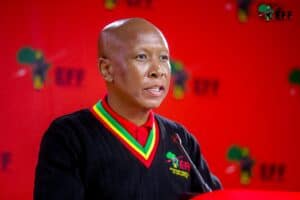Meeting the challenges from the opposition will strengthen the ANC's dominance. How well its new leadership copes will become clearer over coming months.

These are early days for the new Cyril Ramaphosa-led government in South Africa. Two crucial and inter-related strategic challenges face the new president: to consolidate support within the African National Congress (ANC), and to consolidate the ANC’s position as the dominant party in time for the 2019 national elections, seeking to reverse the decline it had experienced under Jacob Zuma.
Dealing with internal ANC issues is the most difficult and the foundation for the others. Zuma is out of power, and will not be back. Even though his departure will weaken their capacity to work as a coherent force, it will take time to dismantle the alliance that made up disparate elements he built around him.
Ramaphosa has started the job by removing the most obvious symbols of Zuma’s alliance with the Gupta family who stand accused of being the major perpetrators of state capture. These include former ministers such as Faith Muthambi who ran public administration and Mosebenzi Zwane, who had been given the minerals portfolio. Both became notorious through combining incompetence and corruption, and have no independent power base within the ANC.
Others who had some internal support were demoted into less prestigious and powerful positions – Bathabile Dlamini, who has been made minister of women and children, and Malusi Gigaba, who is back at home affairs, come to mind.
Picking fights carefully so as not to tackle all adversaries simultaneously is a wise political strategy. Having won with a small margin does not allow him to go ahead with massive purges, an unwise course of action in any event.
As far as trying to forge the ANC into a cohesive force again, Ramaphosa’s real challenge remains closer to the ground. Among local ANC members and representatives an entrenched ethos sees positions of power as key to material benefit and jobs for relatives, friends and political allies. Tackling this is not going to be easy and it’s not clear that Ramaphosa will be able to do it – certainly not in the immediate term.
ANC as the dominant party?
His urgent task is to address the electoral challenges posed by the two main opposition parties, the Democratic Alliance (DA) and the Economic Freedom Fighters (EFF). Both cater to different disillusioned constituencies.
The DA’s main policy platform focuses on good governance and rational management, the EFF’s on radical social change. Their shared opposition to the ANC has made them strange bedfellows in a number of key municipalities, thus removing the ANC from power. But this has already begun to unravel in the wake of Ramaphosa’s ascendancy. In Nelson Mandela Bay the EFF has withdrawn support for the DA, its dominant coalition partner. More political shifts like this may take place in preparation for the next elections.
Ramaphosa can undercut the DA threat by his (re-)appointment of reputable and fiscally responsible people. He has already done so in the National Treasury with Nhlanhla Nene and at public enterprises with Pravin Gordhan. And eliminating blatant cases of nepotism and corruption will also steal DA votes for the ANC.
But tackling the EFF is a more complicated task, as illustrated by the recent re-emergence of the land issue, which is now its clarion call. Can this issue affect the ANC’s electoral prospects? What seems to be Ramaphosa’s strategy in the face of this potential threat?
Land isn’t a new issue, having been a material and symbolic concern for centuries. Colonial conquest and settlement centred on the acquisition of land by force, which played a crucial role in driving indigenous people into the labour market in the 19th and 20th centuries. Addressing the consequences of the 1913 Natives Land Act was a formative experience for the ANC, which had been created in the previous year, and remains a challenge to this day.
Land dispossession entrenched the distinctive feature of the South African economy: migrant labour as the foundation for black deprivation and white prosperity.
In 1994 a land restitution process was put in place by the newly elected ANC government. But it hasn’t met the intended targets for a number of reasons. These have included bureaucratic inefficiency, inadequate support structures for small-scale farmers (in financing, marketing, skill development), conflicts among beneficiaries, corruption and limited interest due to the meagre political weight of claimants.
While it is clear that the cost of land due to the need to offer compensation is not the main problem hampering land reform, it has become symbolic of the obstacles facing the process. When the ANC joined the EFF in parliament in referring the compensation clause for review, it recognised that opposing the motion would be risky, allowing the EFF to speak on behalf of land-hungry people.
It showed that the land conundrum is electorally dangerous for the ANC.
On the other hand, supporting the motion but amending it to conform to other imperatives (stable economy, increased agricultural production, food security) could keep the ANC ahead of the political challenge while retaining its ability to shape the outcome of the review to suit its general policy direction.
Meeting the challenges from the opposition parties will strengthen the ANC’s dominance and Ramaphosa’s control internally. The internal and external challenges could therefore be met in an integrated way. In a sense, this would allow it to return to the position it had enjoyed during Nelson Mandela’s tenure, exercising hegemony over state and society.
But the road is still long and full of obstacles.
Ran Greenstein, Associate Professor of Sociology, University of the Witwatersrand
This article was originally published on The Conversation. Read the original article.






